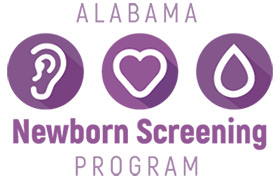Newborn Screening
 The Alabama Newborn Screening Program ensures that state laws, rules, and regulations mandating newborn screening are followed. The program establishes protocols to ensure early identification and follow-up of infants affected with certain genetic or metabolic conditions. Early diagnosis reduces morbidity, premature death, intellectual disability, and other developmental disabilities. The program works in partnership with pediatric specialists throughout the state to ensure all babies identified with abnormal results receive appropriate follow-up.
The Alabama Newborn Screening Program ensures that state laws, rules, and regulations mandating newborn screening are followed. The program establishes protocols to ensure early identification and follow-up of infants affected with certain genetic or metabolic conditions. Early diagnosis reduces morbidity, premature death, intellectual disability, and other developmental disabilities. The program works in partnership with pediatric specialists throughout the state to ensure all babies identified with abnormal results receive appropriate follow-up.
The program also seeks to expand relationships with other health professionals in the state, including hospitals and pediatricians, to enhance existing services and ensure objectives are met. Additionally, there are six Community-Based Sickle Cell Organizations that provide counseling and follow-up for children identified with sickle cell disease or sickle cell trait, as well as one certified Cystic Fibrosis (CF) Care Center in Birmingham that provides CF care.
The Alabama Early Hearing Detection and Intervention (EHDI) Program collaborates with the National Center for Hearing Assessment and Management (NCHAM) to ensure that all infants with hearing loss are identified as early as possible and provided with timely and appropriate audiological, educational, and medical intervention. In addition, the program collaborates with the Alabama Early Intervention System (AEIS) to ensure all infants with hearing loss are identified by three months of age and enrolled in AEIS before six months of age.
The Alabama Bureau of Clinical Laboratories (BCL) is the sole provider of blood analysis of newborn screening in Alabama. The BCL screens approximately 60,000 babies annually, and approximately 150,000 specimens are sent to the lab each year for testing. The panel of testing performed allows screening for approximately 59 core and secondary disorders. The BCL also provides filter paper for screening to medical providers.
The Alabama Newborn Screening Program has an active advisory committee that consists of professionals and citizens knowledgeable in the area of newborn screening. The Alabama Newborn Screening Advisory Committee provides advice to the Alabama Department of Public Health on issues relative to newborn screening.
The History of Newborn Screening
 The first test of newborn screening was developed in 1963 by Dr. Robert Guthrie to detect phenylketonuria, commonly referred to as PKU. It is a serious metabolic disorder in which the body is unable to metabolize certain amino acids and can lead to permanent intellectual disability if not detected and treated early. Before the inception of newborn screening, children with PKU were often institutionalized due to the severity of the developmental disability.
The first test of newborn screening was developed in 1963 by Dr. Robert Guthrie to detect phenylketonuria, commonly referred to as PKU. It is a serious metabolic disorder in which the body is unable to metabolize certain amino acids and can lead to permanent intellectual disability if not detected and treated early. Before the inception of newborn screening, children with PKU were often institutionalized due to the severity of the developmental disability.
In Alabama, newborn screening has continued to expand over the years and currently includes more than thirty primary disorders and over fifty conditions including secondary disorders. In the early 2000s, the introduction of the sophisticated tandem mass spectrometry device allowed for multiple newborn screening tests to be performed simultaneously resulting in quick, accurate, and cost-effective screening.
The Alabama Newborn Screening Program identifies approximately 200 babies yearly with a metabolic, endocrine, hematological, or other congenital disorder. These babies usually look and act healthy at birth. Most affected babies have the opportunity to grow up healthy and develop normally through a simple blood screen that saves babies from death and disability.
Page last updated: March 31, 2023




